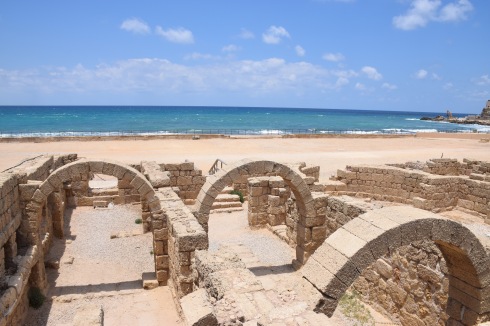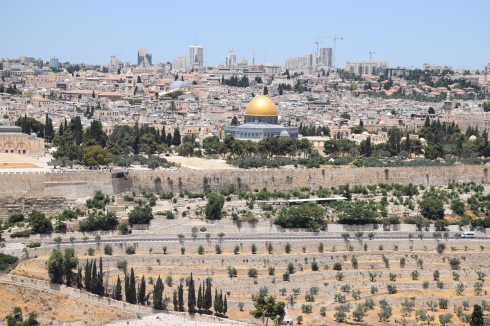“Emek Refa’im street?” I ask the first cab driver I see in Jerusalem. I’m fresh off the plane and don’t know the bus system yet.
He nods. I shimmy into the backseat, wrestling my two backpacks and camera bag, feeling his eyes on me in the rear-view mirror.
“You are not with group?”
“No.”
“Jewish?”
I shake my head.
“Christian? Muslim?”
“No.”
He looks at the road ahead, and lets out a small laugh.
“Why are you here!?”
I usually feel at least one degree of removal while traveling, just by nature of being a tourist. In Israel, however, it was exchanges like this one that quickly made me aware of many more degrees of separation one can tangibly feel if you’re there and you’re Cath:
- Not a local
- Not a Hebrew or Arabic speaker
- Not religious
- Not of Jewish or Arab descent
- Not with a tour group
I could go on, but in short – I am closer to Kevin Bacon than I am to Israel.
I’ve long felt the need to visit Israel, though not for any particular reason. When my inquisitive cab driver asked why I’d come, I froze. Not only because I was surprised by his surprise (was it really so strange to see a non-religious backpacker passing through? answer: yes) – but because I didn’t know my response to the question.
“To see it,” I finally said.
Simple (cliché?) but all that I could really summon in my flash-in-the-pan, back-seat self-analysis was that I wanted to see a land I’ve pondered in many settings: from the Catholic Sunday school I attended as a child, to the bar mitzvahs I frequented as a teenager; from the Muslim wedding I stumbled upon in India, to the New York City classrooms where I study international affairs.
But we don’t fly around the world just to see something, do we? I didn’t sit on a plane for 20 hours, look at the Taj Mahal, and turn around. My answer seemed to satisfy my driver (who curtly responded “good”) – but it didn’t satisfy me. Had I really come here just for the visuals of the Dome of the Rock cresting over the Western Wall or Jordan across the Dead Sea?
I soon learned that it’s easy to rack up visuals in Israel. Thanks to the wonderful friends who hosted me, I hit most of the sights on my list: Jerusalem, Tel Aviv, the Dead Sea, Masada, Golan Heights, three different Roman-era ruins, the usual suspects. Days that started in an ancient city took me to the Syrian ceasefire line by way of Galilee and spat me out into the Mediterranean. I combed the religious sites, took a train three hours to a place I never found, and had enough time just to lay on the beach. The landscapes were stunning, the culture was rich, and the hummus was as divine as they say it is.
But in my estimation, there is a palpable complexity that rises like an ancient steam from the stones that line the labyrinthine roads of Jerusalem, or even the modern highways of Tel Aviv. It’s like you can still smell the burning rubber from the intimate collisions between the three major monotheistic faiths and the competing global powers that continue to take place on this relatively small chunk of real estate. You pass by the wall separating Palestinian territories on the way to the Yad Vashem Holocaust museum, or celebrate Shabbat dinner the night before visiting Bethlehem. You buy Arab spices from a man wearing a kippah who also sells miniature crosses.
It was only after taking in these potent ancient and modern, religious and political juxtapositions and landmarks that I realized why I had come to Israel.
Yes, I came “to see it,” but vision is a means and not an end. Our sight is a vehicle for our hearts; when we see something, we experience something. I was seeking an experience deeper than sightseeing but less than epiphany, more nuanced than cultural exposure but simpler than journalistic analysis.
The events that have occurred for thousands of years in Israel, including the creation of the state itself, raise some of the world’s most complex questions of faith and of justice, with both personal and international variables. I didn’t expect the land itself to solve my religious and political equations, but I guess I figured: if I’m going to be challenged by my spiritual beliefs and political views while sitting at a desk in New York, I might as well be challenged while staring at them in Israel.
Not unlike believers, I came in search of a depth of feeling – but ultimately one of chaos, not clarity. I wanted to wiggle around in my own uncertainty for a little while, in a place that informs so much of it.
If I had that moment to do-over again with the cab driver in Jerusalem, I would. I’m sure it would’ve sparked a really interesting conversation if I’d instead said, “I came here to be confused.”





I love this. And the sweet pic of you. Amsharing and look forward to more “thoughtfulness”.
LikeLiked by 1 person
Those pics are majestic. I couldn’t help but notice your outfit. Also check out treschic99.WordPress.com
LikeLiked by 1 person